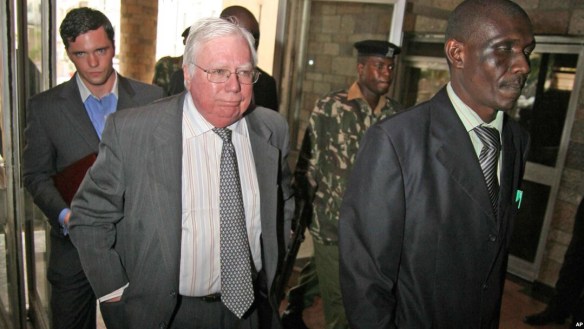Birtherism is back in the news with statements by Jerome Corsi, author of The Obama Nation and Where’s the Birth Certificate?, that he expects to be indicted by the Grand Jury in the Special Counsel investigation of Russian interference in the American presidential election. News stories this week on Corsi’s role in the current investigation used photos from Corsi at Kenya Immigration in 2008 when he was expelled while investigating Obama while I was Regional Director for the International Republican Institute.
Update: Voice of America, Nov 23, “Roger Stone Associate in Plea Talks with Mueller“.

FILE – Jerome Corsi, center, who wrote “The Obama Nation: Leftist Politics and the Cult of Personality, follows an immigration department officer holding his passport.
Likewise, Michelle Obama made news in pre-tour snippets from her new memoir “Becoming” that she most especially found birtherism from Trump unforgivable on a personal basis because of “his loud and reckless innuendos putting my family’s safety at risk.” See “In Her New Book, Michelle Obama Denounces Trump’s Sexism and His Promotion of the ‘Birther’ Conspiracy” from The New York Times.
A few weeks ago I had a piece in The Elephant which ran with the title “From Birther to More of the Same: American foreign policy in the Age of Trump and it’s impact on Kenya.” Salim Lone, former Raila Odinga spokesman, commented: “As always, a very interesting and objective look at our elections and the role the U.S. has played here from Ken Flottman. He is on the dot for pointing out the continuity in Kenya of the Bush Obama Trump arc, but on matters election, I’d give Bush an upper hand.” (I would appreciate any thoughts or observations you might have.)
I wrote about Corsi more specifically and his role in the 2008 United States presidential campaign between the late International Republican Institute Chairman Senator John McCain and then Senator Barack Obama back in 20014 here:
“A few thoughts about ethnic polarization in Kenya as we wait on the ICC”
An important thing for outsiders to realize is how complex, and deliberately obscured, these things are in Kenyan politics–and how much of what is said in popular fora in the United States is at least misleading if not flatly wrong factually and in some cases deliberately malicious. (I have finally just now brought myself to read the whole Chapter 4 on “Kenya, Odinga, Communism and Islam” in Jerome Corsi’s book The Obama Nation which was published shortly after I returned from Kenya in the summer of 2008 during the American presidential campaign. It was a major bestseller and thousands of Americans may have read more about Kenyan politics in that chapter than they have ever read elsewhere over their lifetimes. Corsi . . . paints a picture of the Kenyan election and the post election violence that is very much at odds with my understanding and experience, as well as anything I heard expressed internally at the International Republican Institute, or through my family’s church in Kenya or from our missionary friends or at my children’s missionary supported school. In other words, malicious.)
One of the most important and interesting things that I have learned (so far) from my Freedom of Information Act requests to the State Department relating to observation of the 2007 Kenyan election was that the Ambassador’s staff reported to him and up the chain during the campaign that while there was hate speech showing up on both sides of the ODM/Odinga and PNU/Kibaki contest, the greater weight of it was directed against Odinga. This surprised me because I had relatively limited separate interaction with anyone else at the State Department besides the Ambassador and his personal approach and attitude in my dealings with him certainly gave no hint of this background from his staff in the context of his tactics in addressing the Kenyan campaign.


